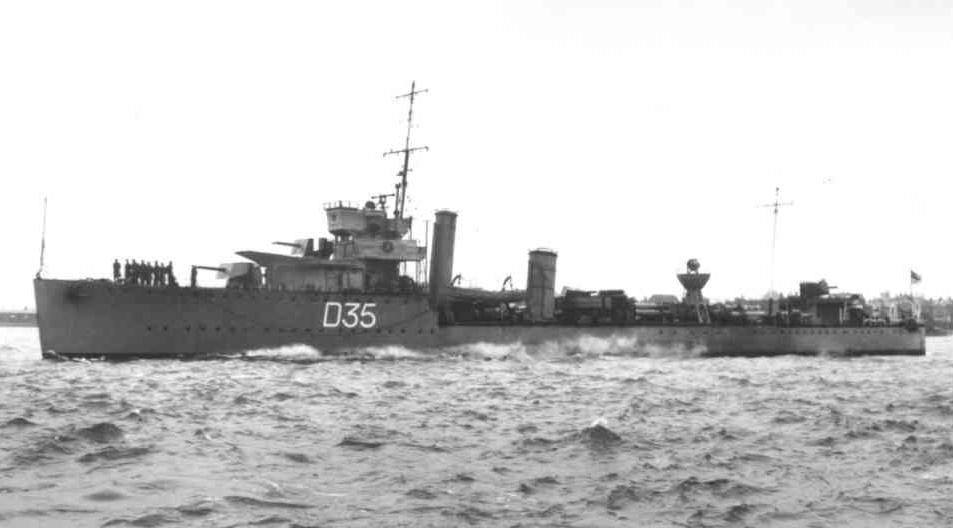Operation Catapult
was the name given to Britain’s attack on the naval fleet of France in
July 1940. It was an attempt to ensure that the Germans did not get
their hands on the six battleships and two battle-cruisers that the
French had in their fleet when France surrendered to Germany after
Dunkirk and the occupation of France. It led to the sinking of most of
the Frech Fleet in harbour at Mers el Kébir near Oran in Algeria and
the death of one thousand French sailors which was the source of much
biterness between the erstwhile allies. The misunderstandings which led
to this heavy loss of life and ships could have been avoided as explained on the historylearningsite.
***************
Wrestler Joined force'H' under Admiral Somerville aboard HMS
Hood, also along were HMS V
aliant, Resolution, Arethusa, Enterprise the Aircraft carrier
Ark Royal and two flotilla's of destroyers. We set sail from Gibraltar at 1400hrs on July 2nd.
The first action occurred at about 2345hrs when a torpedo exploded ahead of the destroyer V
ortigern, she along with
Vidette
carried out a search, there was then much coming and goings between
Admiral Somerville and Admiral Gensoul's emissaries to try and
determine the outcome of the French Fleet which was now berthed at
Mers-el-Kebir and Oran. It was becoming obvious that the
demands of the Admiralty for the French Fleet to surrender to the
British were not going to be met. At 1730 hrs It was 'Action Stations'
and we were detailed to close the entrance to the harbour to intercept
any submarine activity. Soon the 15 inch shells from the
Hood
were whistling overhead causing explosions among the French Fleet with
smoke and flames rising several hundred feet in the air. The shore
batteries were beginning to find our range and shells were falling all
around us, they seemed to be of different colours, each shore battery
must have had its own colour scheme.
Admiral Somerville ordered ordered the
Wrestler "To get out and retire
out of range". Not before time too for we were being straddled, but
'Lucky'
Wrestler came out unharmed. The Battle cruiser
Strasbourg
and some destroyers escaped, we gave chase for a while but due to the
shortage of fuel compelled us to retire and were recalled to the Fleet,
we picked up the crews of two Swordfish which had been shot
down. With Force 'H' back in Gibraltar it was found that we
had lost three Swordfish and two Skua's were lost but only one Skua's
crew was lost. Of the Vichy French - enough said.
Wrestler had become the home of a legion of cockroaches, but I
reckon we had the cheapest and most successful way of helping them on
their way to Davy Jones Locker, but I don't claim
copyright. A jam jar strategically placed in several
messes, burnt coffee placed in the bottom of the jar smeared with
grease (preferably butter), they gave themselves up in droves, tip over
the side, and R.I.P.
Later the skipper made it up to us when a signal said that we must
carry out a boiler clean in Bermuda instead of Liverpool. Each mess was
given a week’s ration of our own island. What a break! talk about
Captain Hook and Long John Silver. They could have had nothing on us,
we lived like pirates for a week. What fun! Old Joe was the oldest
among us but what a good mate to have around when it came to tent
pegging, camp fires and cooking. Best to end on a happy
note!!
Laurie Conlon

 HMS WRESTLER
HMS WRESTLER